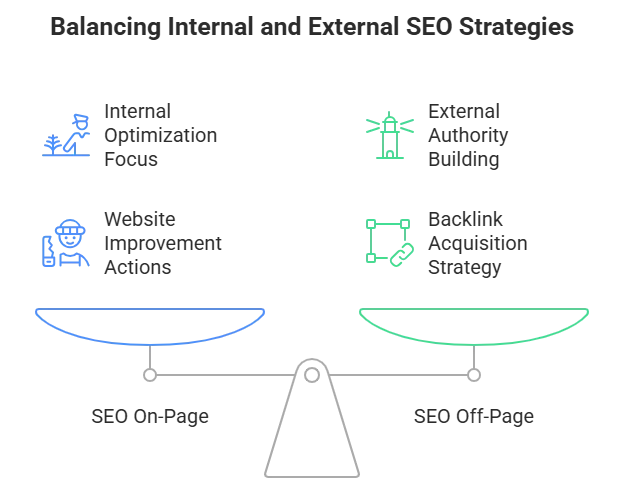SEO On-Page encompasses all optimizations you make within your own website – like improving titles, speed, and content structure. SEO Off-Page involves external actions that boost your site’s authority – primarily earning backlinks from other relevant websites. Think of it this way: On-Page is like organizing your house for guests, Off-Page is getting more people to recommend your house.
Ever wonder why some websites appear at the top of Google while others get lost on page 10? The answer lies in the perfect combination of SEO On-Page and SEO Off-Page. But don’t panic – let’s break down these terms once and for all.

What exactly is SEO On-Page and why does it matter?
SEO On-Page is literally everything you can control and optimize within your own website. It’s like being the interior designer of your own home – you decide where to place each piece of furniture, what color to paint the walls, and how to organize the rooms so guests feel comfortable.
In the digital world, this means adjusting elements like titles, meta descriptions, content structure, and loading speed. According to Backlinko data, websites that load in under 2 seconds have a 9% lower bounce rate than slower sites.
Key SEO On-Page elements include:
- Keywords strategically positioned in titles and content
- Short, descriptive URLs (none of those giant URLs filled with random numbers)
- Optimized meta tags that work as the “trailer” for your content
- Clear structure with headings (H1, H2, H3) that organize information
- Internal links that intelligently connect your pages
- Technical optimization like sitemaps and structured data
The best part? You have complete control over all of this. It’s your territory, your rules.
SEO Off-Page: how to earn Google’s trust through other websites?
Now comes the interesting (and more challenging) part: SEO Off-Page. If On-Page is organizing your house, Off-Page is winning over the neighborhood to speak well of you.
SEO Off-Page primarily revolves around earning backlinks – that is, other websites linking to yours. It’s like a recommendation system: the more relevant sites that point to you, the more Google understands that your content is trustworthy and useful.
Ahrefs data shows that pages with more backlinks from unique domains tend to rank better in search results. But pay attention: it’s not quantity that matters, it’s quality.
Main SEO Off-Page strategies include:
- Link building through partnerships with relevant sites
- Guest posting on niche blogs
- Social media marketing to generate visibility
- Partnerships with influencers and other professionals
- Active participation in online communities
Which strategy works better: focusing on On-Page or Off-Page?
This is the million-dollar question! The truth is that SEO On-Page and SEO Off-Page work as a team – one without the other is like trying to drive a car with just the steering wheel or just the pedals.
SEO On-Page is your foundation. Without a well-structured website with relevant content and good user experience, even the best backlinks in the world won’t save you. On the other hand, a technically perfect site without external authority might stagnate on the first few pages.
The smartest strategy is to start with a solid SEO On-Page foundation:
- Optimize titles and meta descriptions
- Improve site speed
- Create relevant, well-structured content
- Organize internal links
Then, move strategically into SEO Off-Page. And here’s a valuable tip: if you’re building a link building strategy, platforms like inBond can make your life much easier by connecting sites that want to exchange quality backlinks or find guest post opportunities.
How to measure if your SEO strategies are working?

You can’t do all this in the dark, right? You need to track results to know if you’re on the right path.
For SEO On-Page, focus on metrics like:
- Time spent on page
- Bounce rate
- Loading speed
- Keyword positions in search results
For SEO Off-Page, track:
- Number and quality of backlinks
- Referral traffic
- Brand mentions (even without links)
- Domain authority
Free tools like Google Analytics and Google Search Console provide essential data to monitor your progress. For more detailed analysis, paid tools like SEMrush or Ahrefs offer deeper insights into backlinks and rankings.
Understanding the difference between SEO On-Page and SEO Off-Page is fundamental for anyone wanting to conquer top Google positions. Remember: On-Page is everything you control within your site, Off-Page is the reputation you build externally.
The recipe for success has no mystery: start with a solid SEO On-Page foundation, then invest in smart SEO Off-Page strategies. Both work together to show Google that your site deserves prominence.
So, do you know where to start optimizing your website?


